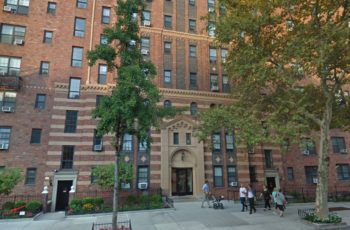
435 West 23rd Street, Manhattan. Credit: Google Maps
Landlord classified rental apartments as being destabilized and charged tenants market rate rents despite receiving J-51 tax benefits. London Terrace Gardens, located along West 23rd Street in Manhattan and built in 1930, occupies an entire block and has 1700 apartments. After the enactment of the Rent Regulation Reform Act of 1993, London Terrace Gardens began deregulating rent-stabilized apartments through high-rent vacancy decontrol. London Terrace Gardens subsequently received J-51 tax abatement and exemption benefits after making appropriate improvements to the property.
In 2009, the New York Court of Appeals ruled that building owners were not allowed to deregulate apartments in buildings for which they received J-51 tax benefits. London Terrace Gardens, however, continued to deregulate apartments. After the Court of Appeals decision in 2009, William Dugan and nine other London Terrace Gardens tenants brought a class action against London Terrace Gardens for unlawfully deregulating apartments while receiving J-51 tax benefits, and for failing to return previously deregulated apartments to rent stabilization status. The tenants sought a declaration that their apartments were subject to rent regulation and that they were entitled to monetary damages.
London Terrace Gardens moved to dismiss the complaint on the ground that the 2009 Court of Appeals decision was not retroactive. London Terrace Gardens claimed that it relied in good faith on a pre-2009 interpretation of the relevant statute by the Division of Housing & Community Renewal, and that applying the 2009 Court of Appeals decision retroactively would violate London Terrace Garden’s due process rights. The Supreme Court in 2019 disagreed, rejected London Garden Terrace’s challenge to the retroactivity of the 2009 Court of Appeals decision, and set forth a methodology for re-calculating the legal rents and amount of any overcharges. Both London Terrace Gardens and the tenants appealed.
While the appeals were pending, the State Legislature in 2019 approved major changes to the State’s rent laws. The Appellate Division, First Department, citing the 2019 amendments, remanded the case to the Supreme Court. The Appellate Division stated that the parties should have an opportunity to present evidence on their respective motions under the new 2019 law which added sweeping changes to rent laws and greater protections for tenants. The Appellate Division ruled that the 2019 law had taken effect immediately and should be applied to any claims by the tenants still pending.
Dugan v. London Terrace Gardens, L.P., 177 A.D.3d 1 (N.Y. App. Div. 1st Dep’t 2019)
By: William McGovern (William is a New York Law School student, Class of 2021.)


An important case but the story is possibly eclipsed by the changes under Regina to Part F of the HSTPA as landlords will no doubt — and wrongly — argue. Let us see what legislatve changes to HSTPA PArt 2 happen in Albany this year before we accept a Supreme Court formula which merely amounts to legalizing the fraud.
MORE HOMELESS WITH SENIORS seniors are there,